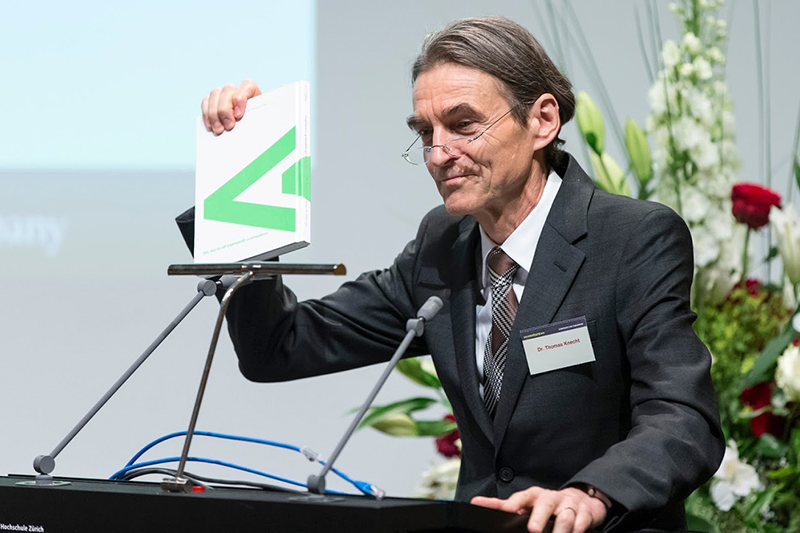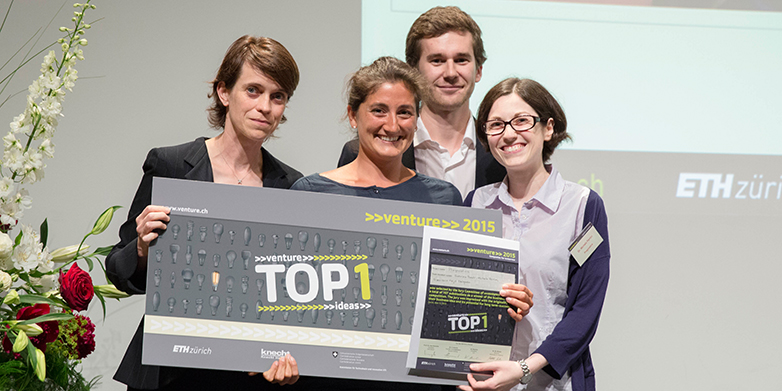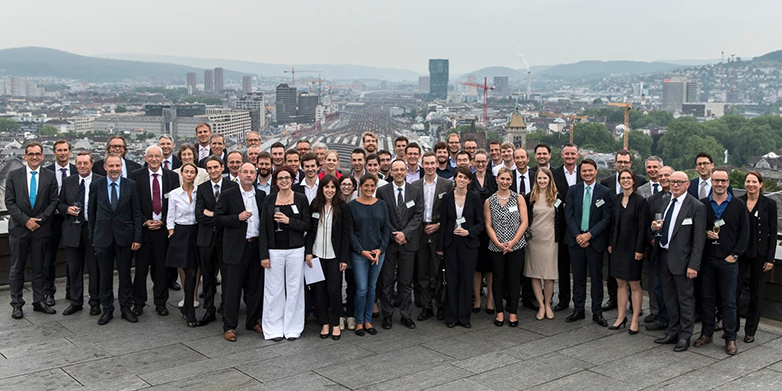A festival of success stories
On Monday, the “venture” start-up competition celebrated its tenth run. Six ETH Zurich companies were among this year’s finalists, with Pregnostics winning the prize for best business idea.
“venture” is a true success story. More than 2,500 teams have taken part in the start-up competition since it was launched in 1998. Some 650 companies have been founded as a result, providing employment to more than 6,000 people over the years. Monday marked the tenth time that a jury of investors and industry representatives selected the best five business plans and the best five business ideas. The winners received their awards at a ceremony held in Auditorium Maximum in the main building at ETH Zurich. “venture” provides the competitors with coaches to support them in developing their business ideas, preparing business plans, and searching for suitable partners and capital. Those plans and ideas that are deemed most promising are named the winners.
This year, participants submitted 95 business plans and 107 business ideas (less detailed than the plans). Most of the teams were from Zurich (91) or the Lake Geneva region (56). ETH start-ups submitted a quarter of all projects, more than any other university. In his opening speech, ETH President Lino Guzzella commented on the many successful companies to emerge from ETH Zurich as part of “venture”, saying: “Our students aren’t just impressive inventors; they’re also highly adept businesspeople.”
Better recognition of premature births
In the competition for the best business ideas, ETH teams took both first and second place. Five out of six finalists are fellows of ETH’s pioneer fellowship programme that supports young scientists on developing an innovative business idea. First-place winner Pregnostics has developed a new system that determines the risk of premature births more accurately than conventional ultrasound techniques. The three-person team is convinced that its system could become the new standard in antenatal care. But as promising as this technology is, there’s still a long way to go before it’s established on the market. As team leader Sabrina Badir explained, “At the moment it’s difficult to find pregnant women who are willing to participate in clinical trials.” Another ETH team, Tap Tools, came in second with their non-invasive system for quickly checking the quality of materials.
The main prize of the evening, which is given to the best business plan and comes with a sum of CHF 60,000, was awarded to Cutiss, a start-up founded by a team led by Daniela Marino and Professor Ernst Eichmann from the University of Zurich. The researchers have developed a new method for creating skin grafts, primarily intended for use in treating people with severe burns. Some eleven million people worldwide suffer from this kind of injury each year.
Cutiss’s method involves taking small, healthy patches of skin from the patient and growing them to as much as 50 to 70 times their original size in a lab before grafting them back onto the patient. The process would offer an alternative to removing large areas of skin from healthy areas, a procedure that often results in heavy scarring. It took the team 14 years of research to get a transplantation process of this kind ready for the market. “We were constantly motivated by the patients we saw suffering every day in the hospital,” said Marino of the Cutiss team.
Medical technology was also the subject of the two best-performing business plans from ETH teams. Start-up company ZuriMED, which won second place, showcased its new device for reconstructing the anterior cruciate ligament (ACL). The device offers an alternative to bone-patellar tendon-bone autografts, which are often painful for the patient and take a long time to heal. Another start-up, Inositec, was awarded third prize for developing a molecule for treating infections of Clostridium difficile. This is the pathogen most commonly associated with colon infections that result from antibiotic treatments in hospitals.
Pages of role models

With »venture» celebrating its tenth birthday, founder Thomas Knecht took the opportunity to look back at the history of the competition. As he related in his speech, Swiss Federal Council member Doris Leuthard had once asked him how the government could support “venture” most effectively, to which he replied: “What we need more than anything else are good role models.” He recalled this exchange as the tenth “venture” approached, and decided to put together a book highlighting ten success stories taken from throughout the competition’s history.
The entrepreneurs featured in the book were present at the evening ceremony and provided a brief glimpse into their success stories. One of these was Glycart Biotechnology, a start-up founded at ETH in 2000 and then bought five years later by Roche for CHF 235 million. Roche CEO Severin Schwan, who serves on the “venture” jury, affirmed right there on the stage that he was extremely satisfied with his company’s 2005 acquisition, and that they continue to invest considerably in Glycart Biotechnology’s ideas to this day. Other role models from ETH included in the book are HeiQ (innovative textiles), Sensirion (high-performance microsensors), Covagen (biotechnology) and Optotune (optical systems).
When asked to name the best aspect of pursuing an entrepreneurial career, Manuel Aschwanden from Optotune replied, “I learned a lot during that time, and thanks to »venture» I was able to learn from the best.” All ten entrepreneurs ultimately agreed that, had it not been for »venture», their companies would probably not exist in their current form. They therefore expressed their gratitude to Thomas Knecht and praised his tireless commitment to supporting young Swiss entrepreneurs. Following the award ceremony, guests were able to literally taste the fruits of “venture” start-up success: the reception was catered by vegetarian and vegan restaurant Tibits – another previous “venture” award winner.


Comments
No comments yet